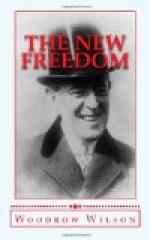One of the valuable lessons of my life was due to the fact that at a comparatively early age in my experience as a public speaker I had the privilege of speaking in Cooper Union in New York. The audience in Cooper Union is made up of every kind of man and woman, from the poor devil who simply comes in to keep warm up to the man who has come in to take a serious part in the discussion of the evening. I want to tell you this, that in the questions that are asked there after the speech is over, the most penetrating questions that I have ever had addressed to me came from some of the men who were the least well-dressed in the audience, came from the plain fellows, came from the fellows whose muscle was daily up against the whole struggle of life. They asked questions which went to the heart of the business and put me to my mettle to answer them. I felt as if those questions came as a voice out of life itself, not a voice out of any school less severe than the severe school of experience. And what I like about this social centre idea of the schoolhouse is that there is the place where the ordinary fellow is going to get his innings, going to ask his questions, going to express his opinions, going to convince those who do not realize the vigor of America that the vigor of America pulses in the blood of every true American, and that the only place he can find the true American is in this clearing-house of absolutely democratic opinion.
No one man understands the United States. I have met some gentlemen who professed they did. I have even met some business men who professed they held in their own single comprehension the business of the United States; but I am educated enough to know that they do not. Education has this useful effect, that it narrows of necessity the circles of one’s egotism. No student knows his subject. The most he knows is where and how to find out the things he does not know with regard to it. That is also the position of a statesman. No statesman understands the whole country. He should make it his business to find out where he will get the information necessary to understand at least a part of it at a time when dealing with complex affairs. What we need is a universal revival of common counsel.
I have sometimes reflected on the lack of a body of public opinion in our cities, and once I contrasted the habits of the city man with those of the countryman in a way which got me into trouble. I described what a man in a city generally did when he got into a public vehicle or sat in a public place. He doesn’t talk to anybody, but he plunges his head into a newspaper and presently experiences a reaction which he calls his opinion, but which is not an opinion at all, being merely the impression that a piece of news or an editorial has made upon him. He cannot be said to be participating in public opinion at all until he has laid his mind alongside the minds of his neighbors and discussed with them the incidents of the day and the tendencies of the time.




